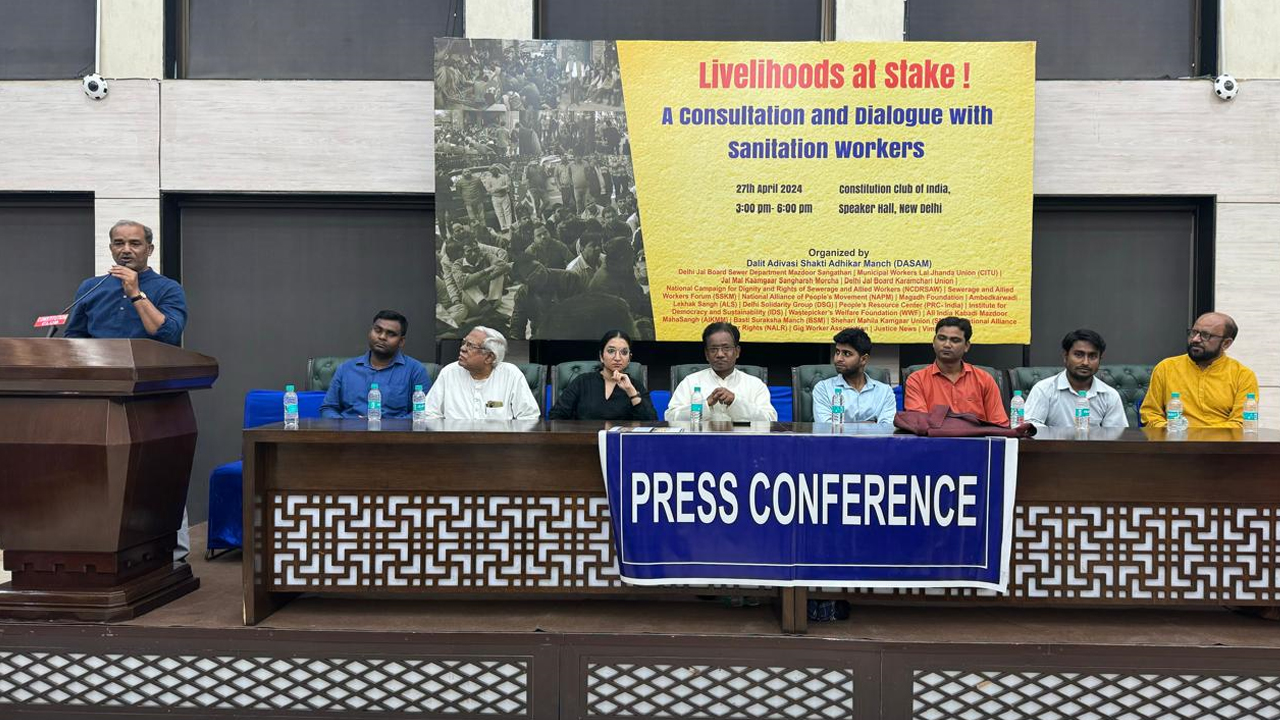Even though the national capital would come to a standstill if the work of sewer workers and informal waste pickers is not done regularly, there is no provision to properly integrate them into the government setup.
New Delhi, 27th April 2024: Sanitation workers in Delhi have been facing unemployment because of the inability of the government sector to properly integrate them. In a consultation meeting and dialogue with sanitation workers held on 27th April 2024 at the Constitution Club of India, New Delhi, many such issues were raised by the sewer workers and waste pickers of Delhi. The meeting was organized to bring the recommendations of sanitation workers, union leaders, academicians, and members of the civil society to the public domain. The consultation meeting was attended by more than 200 sewer workers and waste pickers to discuss the crisis of livelihood faced by them.
Even though the national capital would come to a standstill if the work of sewer workers and informal waste pickers is not done regularly, there is no provision to properly integrate them into the government setup. In the last five months, hundreds of contractual sewer workers were suddenly removed from their jobs by their contractors which brought their lives to a standstill. Hinting at the privatization of sewer work by the Delhi Jal Board (DJB), Virender Gaur, Chairman, Municipal Workers’ Lal Jhanda Union (CITU) said that the Contract Labour (Regulation & Abolition) Act states that permanent natured jobs cannot be done through contracts. Despite this, most of the sewer work which is essential in nature is being done by contractual employees who do not even get minimum wages or proper job security.
Calling the contractual system as Sadabahar ki Ghulami or a system of never-ending slavery, Advocate Kawalpreet Kaur said that the web of corruption that exists under the contractual system cannot be allowed to continue. She also gave an update on the petition filed by contractual sewer workers in the Delhi High Court where the Court has passed an order that no new recruitments will be made until the old workers are reinstated.
Apart from loss of livelihood, sanitation workers also face difficulty in living without social security, safety, or proper health, education and sanitation facilities. Shalaka Chauhan, a Labour rights activist said that around 70% of the household space of waste pickers is used for segregation and storage of waste and only 30% is used for living. No space is allocated to the informal waste pickers for segregation of waste despite their important contribution to the waste management system and they have to store the waste in their household spaces. This not only exposes their families to many health and hygiene risks but also forces them to live a life without dignity.
Speaking of the social exclusion faced by families of waste pickers, Kamala Upadhyay, a senior social activist, said that in her experience of working with children of waste pickers for over a decade she has seen that schools often deny admissions to such children or make efforts to discontinue their education. These children, who help their families in segregation of waste, also face violence and harassment from police authorities. She also said that even in cases of death of a child in an accident in landfills during work, police authorities refuse to investigate or file an official report.
Waste pickers are left with one third of their earlier income, said Rajesh Upadhyay from National Alliance for Labour Rights (NALR), pointing at the fast deteriorating livelihood of sanitation workers. Hannan Mollah, Vice President, All India Kisan Sabha and former Member of Parliament said that in India, only 30% workers are organized and the rest 70% are unorganized which makes it difficult for them to voice their demands to the public. Suggesting a way forward he said that ‘issue based unity’ is a must in organizing workers so that their voices can be heard by the authorities.
The consultation and dialogue with sanitation workers was organized by Dalit Adivasi Shakti Adhikar Manch (DASAM) in collaboration with unions and organizations like Delhi Jal Board Sewer Department Mazdoor Sangathan, Municipal Workers Lal Jhanda Union (CITU), Jal Mal Kaamgaar Sangharsh Morcha, Delhi Jal Board Karamchari Union, National Campaign for Dignity and Rights of Sewerage and Allied Workers (NCDRSAW), Sewerage and Allied Workers Forum (SSKM), National Alliance of People’s Movement (NAPM), Magadh Foundation, Ambedkarwadi Lekhak Sangh (ALS), Delhi Solidarity Group (DSG), People’s Resource Center (PRC- India), Institute for Democracy and Sustainability (IDS), Wastepicker’s Welfare Foundation (WWF), All India Kabadi Mazdoor MahaSangh (AIKMM), Basti Suraksha Manch (BSM), Shehari Mahila Kamgaar Union (SMKU), Association for Social Justice and Research (ASOJ), National Alliance for Labour Rights (NALR), GIG Worker Association, Justice News, and Vimarsh Media.

